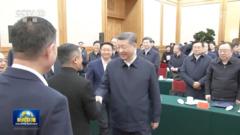Recent images of Jack Ma at a high-profile symposium alongside President Xi Jinping have raised hopes for a more favorable climate for China's tech sector, indicating a possible turnaround amidst rigorous regulations.
Jack Ma's Resurgence: A New Dawn for China's Tech Sector?

Jack Ma's Resurgence: A New Dawn for China's Tech Sector?
The return of Alibaba founder Jack Ma signals potential shifts in China's economic landscape and tech policies.
In a surprising turn of events, Jack Ma, the emblematic founder of Alibaba, made a notable appearance at a recent event alongside Chinese President Xi Jinping, stirring hopes of increased leniency toward the struggling tech industry. After stepping back from public life following his criticisms of China's financial landscape in 2020, Mr. Ma's return has sparked enthusiastic discussions among analysts and market participants alike.
This significant meeting, where leaders from various tech sectors gathered, saw a robust rally in tech stocks shortly after, with Alibaba’s shares climbing over 60% in 2023 and buoyed by a recent positive earnings report. Analysts suggest that Ma's attendance—seated in the front row, despite not speaking—indicates a form of rehabilitation, although some caution that his limited engagement may suggest he has not regained his previous standing.
The political backdrop is equally vital; President Xi's remarks about the necessity of innovation and growth have been interpreted as a signal of reconciliation with private enterprises, marking a stark contrast to the prior months of stringent regulations. The crackdown on tech companies, a campaign associated with the concept of "common prosperity," has left deep scars on the economy, leading to diminished investment and job opportunities.
Recent developments in artificial intelligence, with the launch of DeepSeek's AI model prompting national pride and a shift toward investment in tech stocks, adds another layer to the evolving framework in China's technological ambitions. With emerging sectors like semiconductors and clean energy becoming focal points for national strategy, there is a visible intent from Beijing to align private enterprise growth with broader economic goals.
While some analysts warn against jumping to conclusions about the end of regulatory scrutiny, others hold hope that Mr. Ma's presence could indicate a significant pivot toward a more cooperative relationship between the government and the tech sector. With fresh economic realities and the pressure of international competition looming, China's leadership may indeed be laying the groundwork for a future where private innovation thrives under strategic guidance.
As we observe the unfolding scenario, it becomes clear that Jack Ma's re-entry into the public eye is more than a personal revival; it may very well symbolize a transformative phase for China’s economy, one where balancing governmental priorities and fostering entrepreneurial talent becomes paramount.
This significant meeting, where leaders from various tech sectors gathered, saw a robust rally in tech stocks shortly after, with Alibaba’s shares climbing over 60% in 2023 and buoyed by a recent positive earnings report. Analysts suggest that Ma's attendance—seated in the front row, despite not speaking—indicates a form of rehabilitation, although some caution that his limited engagement may suggest he has not regained his previous standing.
The political backdrop is equally vital; President Xi's remarks about the necessity of innovation and growth have been interpreted as a signal of reconciliation with private enterprises, marking a stark contrast to the prior months of stringent regulations. The crackdown on tech companies, a campaign associated with the concept of "common prosperity," has left deep scars on the economy, leading to diminished investment and job opportunities.
Recent developments in artificial intelligence, with the launch of DeepSeek's AI model prompting national pride and a shift toward investment in tech stocks, adds another layer to the evolving framework in China's technological ambitions. With emerging sectors like semiconductors and clean energy becoming focal points for national strategy, there is a visible intent from Beijing to align private enterprise growth with broader economic goals.
While some analysts warn against jumping to conclusions about the end of regulatory scrutiny, others hold hope that Mr. Ma's presence could indicate a significant pivot toward a more cooperative relationship between the government and the tech sector. With fresh economic realities and the pressure of international competition looming, China's leadership may indeed be laying the groundwork for a future where private innovation thrives under strategic guidance.
As we observe the unfolding scenario, it becomes clear that Jack Ma's re-entry into the public eye is more than a personal revival; it may very well symbolize a transformative phase for China’s economy, one where balancing governmental priorities and fostering entrepreneurial talent becomes paramount.
















